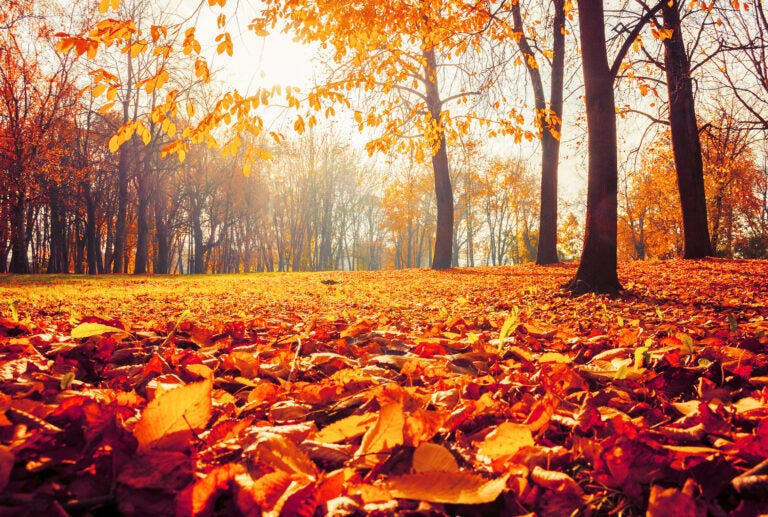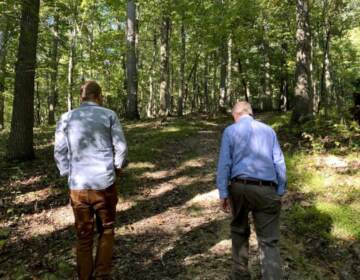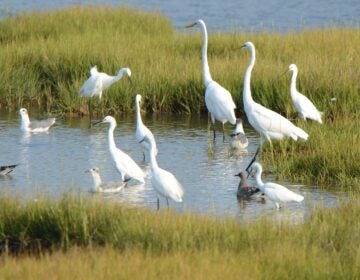Why do we love the way autumn smells? It’s not about pumpkin spice
That brisk, crisp, slightly sharp scent we associate with the fall is the smell of leaves, trees, and plants decaying through the season.

(Syntheticmessiah/BigStock)
There’s something about the scent of fall that people clearly want to capture and remember. Witness Bonfire perfume, pumpkin spice laundry soap, and autumn leaves soaps, candles, and sachets galore.
But it’s the remembering part of that equation that explains the appeal, researchers say. That brisk, crisp, slightly sharp smell we associate with autumn is actually the smell of leaves, trees, and plants dying and rotting. The memories we associate with the change of seasons are what make it pleasurable, even when many of us are allergic to moldy leaves and burning wood.
“The smell of fall represents a lot of decomposition as plants decay,” said Pamela Dalton, a cognitive psychologist at the Monell Chemical Senses Center in Philadelphia who studies how people react to and perceive odors in the environment around them. “As they change from when the leaves were green, and now they’re changing color, they’re also changing the kinds of odors that they give off. And that can be very evocative for us because it’s become associated with a period of time that is a somewhat pleasant transition for most people.”
Many of the “fall” scents that appear in fragrant products or envelop customers as they walk into stores aren’t related to the stunning foliage colors at all. They’re more associated with activities that take place in autumn, Dalton said — like hayrides or baking pies.
“I mean, the aroma of pumpkin infuses almost everything in the fall time,” she said. “But in fact, it’s not necessarily endemic, it’s not coming to us from the environments per se, it’s coming to us because of the activities that we engage in.”
Dawn Goldworm is the co-founder and creative director of 12.29, a company that designs fragrances for clients such as Lady Gaga and brands including Nike, as well as a Christmas scent for Harrods department store. As a professional “nose” or scent designer, she said, people often ask her to recreate the scent of babies and puppies.
“We just don’t have the molecules to recreate the smell of new life,” she said.
Because her nose is so trained, Goldworm said she smells things in different dimensions — she senses the color of the odor, the shape, the temperature, and the weight.
“So when the seasons change, the first thing that hits my nose is the temperature of the odor molecule feels cooler, it feels fresher. It feels crisper, particularly when you go from summer to fall,” she said. “Then, of course, and this is a smell that everyone loves and enjoys and talks about not necessarily in this way, I smell the off-gas from the leaves decomposing, when they’re starting to change color and fall off the trees.”
But the smell of fall (or any season) in one place means something completely different in another, depending on the trees, the ground, the air, and the natural vegetation, including the plants and flowers, Goldworm said.
“So every place in the world has its own branded scent identity, if you will, its own personality,” she said.
Dalton said she grew up near the seashore, where the fall smells completely different — more of a marshy, swampy aroma, as the area between the mainland and the island dries up. It doesn’t smell anything like it would in a forest or a city like Philadelphia, she said.
Fall is her favorite season, Dalton said, because she enjoys the cooler weather and lack of humidity, but also because of the activities that take place. The scent hits her when she’s walking through the city, and people first start burning wood fires at home. It brings back all these memories of warmth and comfort and being close together, she said. Like many people, however, she can’t have a fireplace herself because of allergies.
Winter, on the other hand, is remarkable for its lack of olfactory triggers, both Dalton and Goldworm said. Because it’s colder, the ground is harder, and there’s no grass or flowers to emit scents.
Goldworm said winter smells like calm to her, because it gives her nose time to relax.
Snow has a definite smell, though.
“Snow smells different everywhere in the world as well, of course, because of the ground it’s on and the water that makes up the snow is different,” Goldworm said. “Snow smells wonderful. It’s also like taking a big breath, and it makes me hungry.”
She said it’s always interesting to “turn your nose on. And not necessarily just in a natural way, in an artificial way too, there are companies as well as environments that are trying to get you to be festive and enjoy the moment.”
As humans, Goldworm said, we often miss the moment.
“So opening up your nose to what’s happening today, right now — in nature or in the artificial environment that we’ve created as humans — is the most joyous time.”

Get daily updates from WHYY News!
WHYY is your source for fact-based, in-depth journalism and information. As a nonprofit organization, we rely on financial support from readers like you. Please give today.






